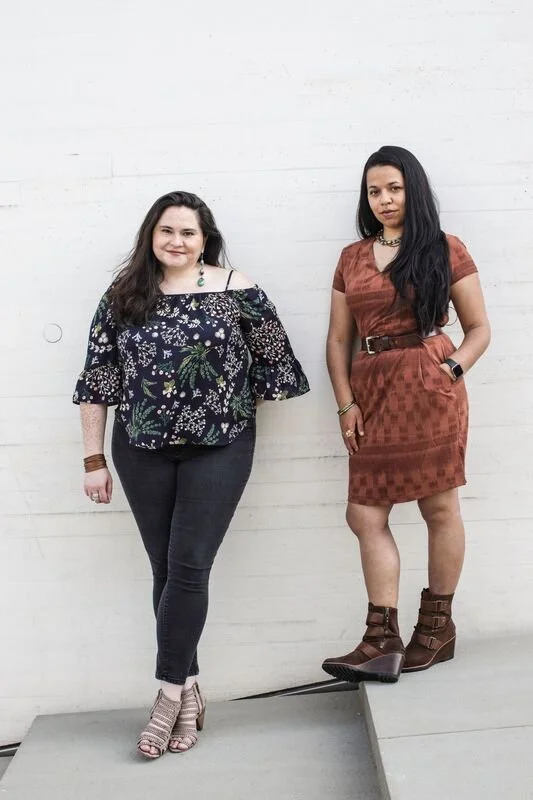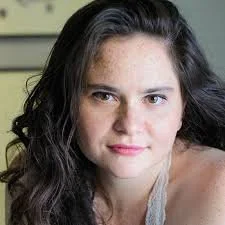THE CARLISLE PROJECT
The Carlisle Project is a multidisciplinary song cycle, ceremony, and ritual centering the experience of Native peoples who attended or descended from students of the Carlisle Indian Industrial School.
Creative Team
Written by, Ronee Penoi and Annalisa Dias
Annalisa Dias
Annalisa Dias is a Goan-American transdisciplinary artist, community organizer, and award-winning theatre maker working at the intersection of racial justice and care for the earth. She is a Co-Founder of Groundwater Arts and a Co-Director of HERE Arts Center.
Prior to joining HERE, Annalisa was Director of Artistic Partnerships & Innovation at Baltimore Center Stage for 5 years. Before that, she was a Producing Playwright and Acting Creative Producer with The Welders, a DC playwright's collective; and a Co-Founder of the DC Coalition for Theatre & Social Justice. Artistic credits include: WRITING: 4380 Nights, the earth that is sufficient, One Word More, The Last Allegiance, A Legacy of Chains, Crooked Figure, Consider the Dust, Matanuska, Coal, and Servant of the Wind. DEVISING: Wit's End Puppets: Malevolent Creatures; banished? productions: Tyger; Theater Alliance: I Love DC. DIRECTING: Source Festival: Dust to dust to dust and Dressing Bobby Strong; The Salima Project (film). Annalisa’s work has been produced or developed by Mosaic Theater, Rep Stage, The Welders, Theater Alliance, Signature Theatre (DC), Arena Stage, the Phillips Collection, The Gulfshore Playhouse, the Mead Theatre Lab, The Hub Theatre, Spooky Action Theater, Tron Theatre (Glasgow), and OverHere Theatre (London). Annalisa frequently teaches theatre of the oppressed and decolonization workshops nationally and internationally and speaks about race, identity, and performance. She is a TCG Rising Leader of Color.
Annalisa's work has been supported by ArtsEmerson, Berkeley Repertory Theatre, The Ringling, the Kennedy Center REACH, the DC Commission on the Arts & Humanities, the Saul Zaentz Fund for Innovation in Film & Media at Johns Hopkins University, the Puffin Foundation, the Keshet Dance and Center for the Arts, the Network of Ensemble Theatres NET/TEN program, TCG's Global Connections program, and the Mead Theatre Lab.
Ronee Penoi
Ronee Penoi (Laguna Pueblo/Cherokee) recently joined ArtsEmerson in Boston as Director of Artistic Programming. Previously, she was a Producer with Octopus Theatricals, where she advanced the work of Cherokee artist DeLanna Studi (And So We Walked), Phantom Limb Company (Falling Out), Ripe Time (Sleep), Homer’s Coat (An Iliad by Denis O’Hare and Lisa Peterson), Theatre for One, and more. She is a two-time ISPA (International Society for Performing Arts) Global Fellow, and has been an APAP (Association of Performing Arts Professionals) Leadership Fellow and TCG (Theatre Communications Group) Rising Leader of Color. Ronee is also a Founding Member of The Industry Standard Group (TISG), a multimedia commercial investment and producing organization with an intentional focus on increasing the presence of BIPOC (Black, Indigenous, and People of Color) investors and producers in the commercial producing field and expanding the access and opportunities granted to BIPOC communities within the industry. She is also co-founder (and current core collaborator) of the Groundwater Arts Collective dedicated to climate justice in the arts (recipient of a SPACE at Ryder Farm Residency Grant). She is a proud NEFA (New England Foundation for the Arts) National Theater Project Advisor, and part of the working consortium of First Nations Performing Arts. Ronee is a two-time recipient of the DC Commission on the Arts and Humanities Individual Artist Fellowship, as well as commissions from Baltimore Center Stage and Pittsburgh Public Theater, for her musical composing work with collaborator Annalisa Dias. Previously, Ronee was NNPN Producer-in-Residence at Woolly Mammoth Theatre Company, Senior Producing Fellow and Directing Fellow at Arena Stage, and toured nationally with Anna Deavere Smith’s Let Me Down Easy. She spent three years with the Consensus Building Institute, a non-profit specializing in facilitation and mediation services. Her current anti-racism practice builds upon a decolonization framework and embraces systems change as a key component of that work. She graduated with honors from Princeton University with a degree in Music with certificates in Vocal Performance and Theatre & Dance. She has been invited to guest lecture on producing at Princeton University, CalArts, Howard University, and for American University’s graduate Arts Administration program.
Development History
The Carlisle Project has been supported by:
Berkeley Rep’s Ground Floor residency
The Center for the Futures of Native
Peoples at Dickinson College
Pittsburgh Public Theater and Baltimore Center Stage
(both theatrical commissioners)
The Hopkins Center at Dartmouth
The Kennedy Center REACH
The Network of Ensemble Theatres
We also were recently short-listed for the 2025 Awards Cycle of Creative Capital.
From Ronee Penoi
“In many ways, this work has been the project of my entire life. My great-grandfather Mark Penoi attended Carlisle Indian School. He, my grandfather, and my father attended and taught at Indian residential schools, with assimilation as the schools' primary aim. My father and I worked hard to break the cycle of intergenerational trauma that my family inherited. He spoke at the 2003 dedication ceremony for a state marker on the site of the former school, placed near the cemetery where many Indian children had died. Among his reflections, this quote stood out to me: "Have our voices become more clear in pointing up the danger from those who bring sorrow? Who is watching, watching for the weak minded who would speak with the words of the strong and create a sorrow that lasts for generations? That is my question." Now, in this second Trump presidency, these words feel prescient. This musical is my ancestral calling to gather us - Native and non-Native - to reckon with and heal from the poison of the past, and to leverage the truths of these experiences to prepare us to face the divisive forces of assimilation, otherness, and pain that similarly seek to divide us now.”



